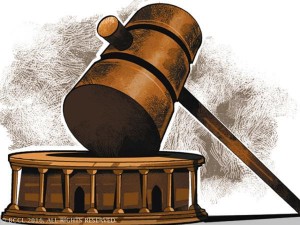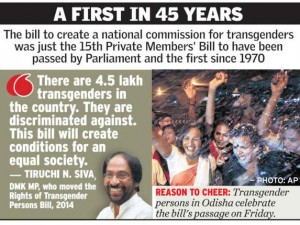In this blog post, Harsha Asnani, student, NIRMA University, Ahmedabad analyzes the Transgender Persons Bill, 2016.
Introduction
Ostracized from the mainstream community coupled with the lack of any recourse on gender identification, one of the major chunks of India’s population, popularly known as the “transgender,” continues to face serious human and legal right violations. This issue has come into the limelight with the passing of the Supreme Court Judgement by a two-judge bench in the case of National Legal Services Authority v. Union of India which in the words of Justice K.S. Radhakrishnan had ruled that “recognition of transgender as a third gender is not a social or medical issue but a serious human right issue.” Concerned with this widespread, entrenched discrimination and lack of practical implementation of the said judgment, the Indian legislature has taken a major step to tackle this social exclusion issue.
Overview of the Transgender Persons Bill, 2014
The Rajya Sabha passed the Transgender Persons Bill, 2014 on April 24, 2015. The Bill consists of various rights on social, economic and political entitlements, privileges, and immunities for transgenders. It also entails several duties on educational and employment providing institutions to provide equal and inclusive opportunities to this unidentified community. In addition to this provisions have been made for enactment and implementation of necessary schemes in order to provide social security, rehabilitation, and recreation to the transgender. Providing safeguards and promotion of rights of transgender persons for attaining adequate living standards and conditions to enable them to live independently in the community is another peculiar feature of this Bill. 
The introducers of the Transgender Persons Bill were of the opinion that the issue of transgenders should not be mixed with the lesbian-gay-bisexual issues because of diverging concerns of the two groups. The former suffers from a grave problem of lack of one’s identification in various walks of life whereas the latter’s problems are concerned with the acceptance of their sexual orientation by the social and legal community.
Rights Guaranteed under the Bill
Chapter II deals with the rights and entitlements that this act envisages to provide to the transgender. Firstly, it provides them with the right to equality regarding Article 14, 15, 16. Regarding Article 19, the bill provides an opportunity to the transgenders to have an equal basis as that of all other persons regarding expressing their views in matters that directly or indirectly affect them.
Concerning Article 21, this bill aims at providing a right to dignified life and personal liberty on an equal basis with that of people belonging to other genders. This includes right to live within a community and places of one’s choice, assurance of a free and unrestricted access to a range of in-house and community support services coupled with necessary assistance for supporting a living and inclusion within the community. Right to life within this bill also includes the right to respect for his or her physical and mental integrity and the right to protection from any subjection to torture, inhuman and cruel treatment, abuse, violence or exploitation. The interpretation of Right to life under this Bill has been extended to the right to home and family, i.e., no transgender child shall be forced to live away from his or her parents except under conditions where a competent court is of the opinion that it is in the best interests of child or where the parents or the immediate guardians of the child are unable to take care of him, or her then assign the custody of such a child to his or her extended family, or within the community in a family setting. 
Following the imprints of interpretation of Article 21 of the Indian Constitution other rights that have been included in this Bill are right to decent living conditions in matters related to healthcare, food and nutrition, counselling etc., right to shelter to those transgender children who have no families and without any means of livelihood and shelter, right to safe drinking water and sanitation facilities in all areas especially urban slums and rural areas, right to pension similar to that of other persons subjected to income limits, right to unemployment, allowances to transgenders suffering through the phase of unemployment provided that they are registered with an employment exchange agency for not less than two years and those who could not find any means of gainful employment or occupation.
The Act covers a very broad array of sectors wherein it envisions creating provisions to uplift the community of transgenders so that they can be brought at par with men and women.
Duties entailed on Various Agencies
The Transgender Persons Bill, 2014 levies a few duties on certain government agencies in furtherance of achieving the objectives as envisaged by this piece of legislation. It gives power to the government and local authorities to take necessary steps to establish proper means of accommodation for the people belonging to the transgender community. Also, the Government and local authorities need to ensure that the community services and facilities are available generally and on an equal basis to the transgender persons; that they are not subjected to torture or abuse either inside nor outside their homes.
Any Executive Magistrate, on receipt of the information from a person or a registered organisation who has a reason to believe that any act of abuse, violence or exploitation is about to be committed or has been committed against a transgender, shall take immediate steps to ensure that this act has been refrained from occurring and the victim is rescued and rehabilitated to a place of safe custody.
The police officers, on receipt of an information regarding any case of abuse, torture, exploitation, are obliged to make the victims aware of their rights under this proposed legislation which includes information regarding right to protection, right to filling complaint, right to free legal services as provided under the Legal Services Authorities Act, 1987 or any other services offered by the National or State Legal Services Authority information and particulars of the agencies working for rehabilitation of such transgender persons subjected to abuse, torture etc.
The educational institutions maintained, recognized or funded by the Government or other local authorities are mandated to admit transgender students and create no distinction or practice discrimination. Education also includes promoting opportunities for sports, recreation and leisure activities, creating reasonable accommodation as per individual’s requirements, creating a supportive environment in maximizing social and academic development for creating full inclusion. They are also required to ensure, monitor their participation and completion of education of all transgender children. Along with regular courses, adult education should also be provided to the transgender children.
As far as employment opportunities of transgenders are concerned, the Government’s role is not only limited to creating schemes and programs to help transgenders in finding employment opportunities but also extends to vocational training and instituting mechanisms for providing loans with concessional rates of interest for promoting self-employment ventures and marketing their respective products. The employing agencies are also mandated to create no discrimination in matters related to employment, the right to appear for selection, etc.
Separate HIV Sero-surveillance Centres have to be set up to tackle various health issues related to sexual matters. These centers should provide free of cost sex reassignment surgery and a barrier-free access to such health care centers.
The Act requires the establishment of National and State level Commission for Transgender Persons which is assigned with various functions. These functions, in a nutshell, involve monitoring, supervising and reviewing the implementation and enforcement of all the provisions of this act or any schemes and programs made thereof. Chapter VIII deals with the establishment of Transgender Rights Courts for easy disposal of civil cases which are filed by transgender persons in respect of infringement of their rights under any law in force within the territory of India.
Shortcomings of the Bill
Although the Transgender Persons Bill, 2014 aims at covering all the loopholes in matters related to the treatment of transgender in the country but in response to this Bill, the Ministry of Social Justice and Empowerment had come with a few areas where this Bill stands to be disappointing. Firstly they are of the opinion that the Transgender Bill does not comprehensively reflect the existing literature over the rights of transgender. It is suggested that the Intersex people should also be included in the present bill as they also face such acute issues of recognition, healthcare, nutrition, etc. Secondly, self-identification is recommended by way of notarized legal affidavits so that they can be used to make necessary changes to the legal gender markers and hence not remain limited to general identity cards such as ration cards, PAN cards, etc. It is recommended that issuing of the transgender certificate be carried on by a Governmental authority as it will lead to setting up of gatekeepers or brokers at different levels. Further a separate chapter on healthcare should be brought up. Transgender should be recognized as socially backward groups, and affirmative action should be planned for their upliftment.
Special focus should be brought about to avoid higher drop-out ratios due to harassment and hostile environment in school. Counseling and training sessions should be organized for parents and teachers respectively for providing sensitisation. Adequate medical leaves are provided for sex reassignment surgeries, internationally accepted health practices be adopted.
 Serato DJ Crack 2025Serato DJ PRO Crack
Serato DJ Crack 2025Serato DJ PRO Crack










 Allow notifications
Allow notifications


